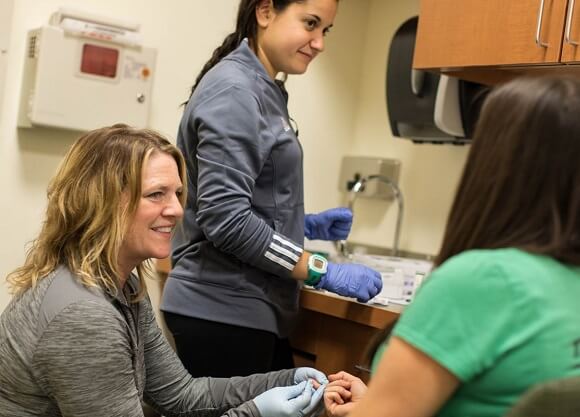
Nursing professor committed to providing holistic care
December 15, 2017

December 15, 2017

The associate professor of nursing was in not one, but two accidents where she was hit by a car — crushing the same leg. After completing her rehabilitation, Myrick not only appreciated the critical role of her health care providers, but was also motivated to use her experiences as a means to teach her students.
“Teaching is so gratifying on so many levels: How can I give back to my profession? How can I make a difference with my students?” she said. “When you’re teaching, if you can inspire or change even one student, you’re going to have an impact on all their [future] patients too, so it’s pretty awe-inspiring.”
Through the exceptional care she received, she was able to complete 3 half-marathons a year after her most recent injury.
At the School of Nursing, Myrick teaches best practices and evidence-based care, all with a keen eye on treating patients holistically — to understand each patient’s body, mind and spirit to provide the best possible care and not just look at physical symptoms. She is proud Quinnipiac is one of only 12 nursing schools in the nation endorsed by the American Holistic Nurses Credentialing Corporation.
But her work extends far beyond the classroom.
On Sundays, she still practices clinically at an urgent-care facility where she specializes in orthopedic sports medicine. It’s a chance to keep her skills sharp as a nurse and a professor.
“These experiences give you renewed credibility and insight. So now, when my students ask, ‘When is the last time you did that?’ I can tell them, ‘Last week.’ You never stop learning as a nurse,” Myrick said. “Things change daily in this field, so we have to be on top of everything and give our students the most up-to-date information.”
Myrick is part of a team of students and faculty who are developing a virtual reality simulation that demonstrates proper patient-transfer techniques to future health care professionals. It gives students across the university — from physical therapy to engineering and game design — to work with and learn from each other.
The program addresses both patient and health care providers: it aims to reduce the risk of dropping a patient during a transfer and reduce the risk of lower back injury among the health care provider lifting the patient.
“We were looking for a high-impact project that addressed actual problems,” Myrick said. “We found out that back injuries take the most nurses and physical therapists out of the workforce. The idea grew from there, and morphed into a major initiative.”
This project, made possible by The Center for Interdisciplinary Studies, required the collaborative expertise of students and faculty from 4 Quinnipiac schools and 6 disciplines: biomedical science, nursing, computer science, game design, industrial engineering and physical therapy.
Myrick is also a Quinnipiac researcher who has partnered with students and peers from Yale to study runners who completed the 2015 and 2017 Hartford Marathon for acute kidney injury.
Myrick and the team found a possible link between the stress, the elevated body temperature and the decreased blood flow to the kidneys during exertion and a short-term reduction in kidney function. And these findings have been published in the American Journal of Kidney Disease.
Ultimately, it’s the teaching — by bringing theory, research and practice together for the students — that Myrick finds especially gratifying.
Quinnipiac Today is your source for what's happening throughout #BobcatNation. Sign up for our weekly email newsletter to be among the first to know about news, events and members of our Bobcat family who are making a positive difference in our world.
Sign Up Now